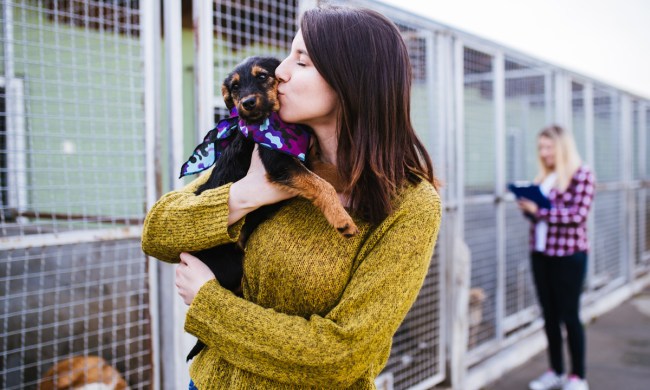You may look at a Chihuahua and think it’s the tiniest dog ever, but the teacup version proves even smaller (and potentially cuter). What this buddy lacks in size, they make up for in feistiness. You will never have a boring day when you spend it with a teacup Chihuahua! Before bringing home this little guy, you need to know a bit more about their backstory and special requirements. After all, having one of the smallest dogs out there will take some extra TLC — and expertise.
What is the history of the teacup Chihuahua?

Chihuahuas originally hail from Mexico and the modern version were bred in the 1800s. Of course, their ancestors, the Techichi dog, have lived in the Americas for thousands of years and cohabitated with the Aztecs and other people in the area.
Ancient Chihuahuas were likely quite a bit bigger than their modern counterparts, certainly much larger than the teacup variety. Today, Chis have absolutely exploded in popularity and are one of the top dog breeds in the U.S. The teacups don’t represent a different breed and instead were created by selecting the smallest buddies as parents.
What is a teacup Chihuahua like?

If you bring home a teacup Hua, they’ll weigh about 3 pounds and measure 6 inches tall — itty bitty. While their size is the thing that stands out the most, you can find this pup in all sorts of colors, including white, black, and brown, or a mix of a few of these. Normally, you’ll see the iconic apple head, though the deer head variety does exist in all sizes (they tend to be a bit bigger).
In terms of personality, expect all the famous Chihuahua spunk (and also the yappy bark, which can outdo their size). You may end up shocked by their energy level, which doesn’t seem commensurate with their stature. Unfortunately, while Chihuahuas are one of the longest-living dogs, their minute cousins don’t always make it as long, about 7 to 12 years. Still, by taking really good care of them, you will get well over a decade with your sweet pet.
How do you take care of a teacup Chihuahua?

These guys are not starter pets, and this is in part because you need to pay close attention to them almost at all time. In addition, they don’t do well with small children who might not understand how to play with them carefully. Speaking of which, even though Chihuahuas don’t need nearly the amount of exercise of a golden retriever or border collie, they love to play and will want short walks. Prepare to schedule at least 30 minutes every day on a short leash with a harness (small dogs generally shouldn’t walk with a collar).
Lastly, make sure to invest in training, and the younger the better. Chihuahuas have a reputation for aggression, which nearly always stems from fear and poor training. They make excellent watchdogs and will turn protective over their families.
Are teacup Chihuahuas easy to train?

Well, not really. There’s a reason that we only recommend these little guys to experienced pet parents (and you probably don’t want a teacup Chi as your first little dog if you’ve had large animals previously). All Chihuahuas have a stubborn streak and may just decide not to listen.
However, proper positive reinforcement training will go a long way to teaching them to follow basic commands. Of course, you can find some incredibly smart and professional Chihuahuas that act as service dogs and win competitions. But by and large, these aren’t at the top of the list in terms of overall intelligence.
Do teacup Chihuahuas do well in apartments?

If you live in a small place in a big city, this might end up as the perfect dog for you. Don’t forget that the little beastie can be prone to barking, and the general noise of an apartment or condo building could set them off. Proper training will go a long way to keeping them quiet even when the neighbors get home.
Also, remember that they do need proper exercise in walks and playtime. In a big city, you need to be extra careful about them getting stepped on when out and about. Consider investing in a dog stroller or sling for walking through crowded areas.
So, is a teacup Chihuahua your next pet? We sure hope so. As with any purebred dog, you will probably have to pay a bit of money upfront, as you’re unlikely to find one of these pups in a shelter. However, some rescue organizations specialize in small dogs and you could stumble on one there. No matter how they come into your life, you’re sure to love your new loyal and affectionate 3-pound bundle of joy.




